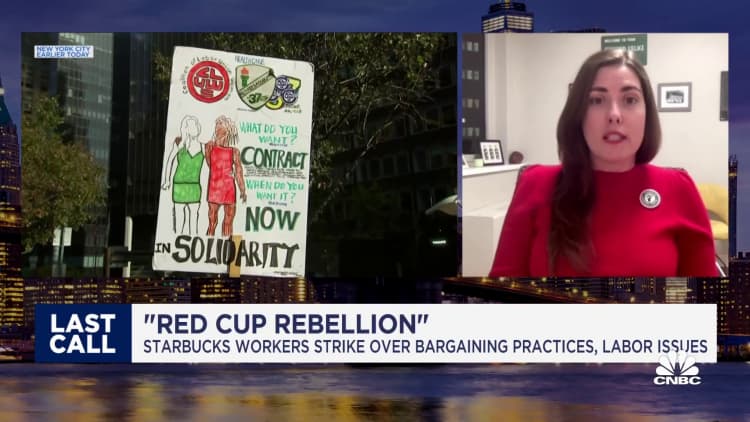Scott Olson | Getty Images News | Getty Images
There will be no fooling California fast-food workers come April 1. That’s the day they can honestly believe the minimum wage in the Golden State will jump to $20 an hour from $16, and only in that sector.
The pay raise exclusive for that workforce, estimated at more than 500,000, is the centerpiece of Assembly Bill 1228, a compromise law hammered out last summer by fast-food companies, the Service Employees International Union and Governor Gavin Newsom’s administration. All three sides hailed the negotiated outcome, though the industry knows the alternative could have been calamitous.
AB 1228 overrode a previously passed — and highly contentious — bill, AB 257, that would have raised the hourly minimum to $22, created a Fast Food Council with authority to mandate working conditions and imposed a joint-employer rule making franchisors liable for franchisees’ infractions. And in the process, the industry and the SEIU each saved millions earmarked to lobby voters on a November ballot referendum to decide the matter.
“Anyone looking at this in the industry, now that emotion has been removed from the negotiation, sees this as the least bad option or worst good option, depending on which side you’re on,” said Matt Haller, president and CEO of the International Franchise Association, a trade group that represents franchisors, franchisees and franchise suppliers. In exchange for concessions, and staring down a very uncertain outcome on the referendum, “We have this very predictable business environment for our members moving forward,” he said.
Although they dodged some bigger bullets, McDonald’s, Chipotle Mexican Grill, Starbucks, Yum! Brands’ Taco Bell, Shake Shack, El Pollo Loco, In-N-Out Burger and other fast-food chains — operating nearly 30,000 franchised and company-owned restaurants in California — are nonetheless busy strategizing how to mitigate the certain bump in their labor costs.
They’re also dealing with the likelihood that an energized SEIU will step up its long-standing goal of unionizing fast-food workers, something the industry has thus far mostly avoided, while simultaneously keeping a wary eye out for similar minimum wage legislation and union organizing efforts in other states.
The overwhelming, and unsurprising, response from franchisors is that they plan to raise menu prices, a tactic they’ve been using lately to contend with inflation, higher interest rates and supply-chain costs and previous wage increases triggered by the success of the nationwide Fight for $15 movement launched a decade ago. “They’re still figuring out how much, but we know everyone is going to increase prices,” said Brian Harbour, an industry analyst at Morgan Stanley, noting, however, that franchisees generally have discretion on the prices they charge.
Indeed, when Harbour asked McDonald’s executives, during the company’s third-quarter earnings call in October, about possible price increases post-1228, CEO Chris Kempczinski said, “There is going to be a wage impact for our California franchisees. I don’t think, at this point, we can say exactly how much…. Certainly, there’s going to be some element of that, that does need to be worked through with higher pricing.” The world’s largest fast-food chain, McDonald’s has 9% of its nearly 13,500 U.S. locations in California, most of them franchises.
That sentiment was echoed by Chipotle, which operates about 460 company-owned locations in California. “We have not made a decision to raise prices in California to offset the anticipated labor increase in California next year,” said a company spokesperson in an email to CNBC, “but our CFO, Jack Hartung, said on the Q3 earnings call that we are studying it and anticipate we would need to increase prices mid-to-high single digits, (i.e. mid is 4-5-6% and high is 7-8-9%), and that means prices will be that much higher as a percentage.”
Other recent earnings calls have elicited similar remarks. “We will rely on pricing,” said Jack in the Box CEO Darin Harris, anticipating a rise in menu prices between 6% and 8%. How consumers react to this latest round of price hikes, he added, raises uncertainty in the chain’s sales projections for the coming year.
“Everybody who’s doing business in California, and is subject to this new mandate, is going to [raise prices],” Haller said, adding that the consensus is in the 10% range. “The question is, how far can you take price until you turn off your value [to customers]?”
Order kiosks, drive-thru chatbots and automation
Beyond increasing prices, California’s fast-food restaurant operators are exploring other measures to counterbalance the wage hike, such as automating certain tasks as a way to increase workers’ efficiency and productivity and potentially eliminate some jobs altogether. For example, automated drink dispensers and robotic burger flippers are being tested around the country. Chipotle, Starbucks and Sweetgreen are experimenting with automated food and beverage preparation systems.
Earlier this year, Wendy’s began testing generative AI chatbots to take drive-thru orders and is now offering the human-free technology to all its franchisees, including nearly 300 in California. Among others jumping on the chatbot bandwagon are Carl’s Jr., Hardee’s, Del Taco, McDonald’s and Sonic Drive-In.
Inside fast-food restaurants, self-order kiosks are trending after nearly a decade of testing by Panera Bread, McDonald’s and Burger King. Yum Brands, the owner of fast-food chains KFC, Taco Bell, Pizza Hut and The Habit, is aggressively installing them. “On average, kiosk sales see 10% higher checks compared with front counter sales and excellent profit flow-through,” Yum CEO David Gibbs told investors in August.
During El Pollo Loco’s November earnings call, interim president and CEO Maria Hollandsworth reported positive tests with kiosks, “resulting in reduced restaurant-level labor hours per day,” she said. Along with rolling them out across the chain, she said the company is also “driving labor efficiency” with new salsa processing equipment and is testing “additional initiatives, such as automated dishwashers.”
By definition, automation minimizes human input, a reality the SEIU hopes won’t overly affect California’s fast-food workers as a result of AB 1228. “We’re hopeful the companies genuinely appreciate the value and the contributions of their workforce as part of the customer experience,” said Joseph Bryant, international vice president of the SEIU. “It’s on all of our minds what will be the impact of this next wave of technology, driven by AI, and at the end of the day, I don’t think anybody thinks it’s a better experience to deal with pads versus people.”
The impact of the new law is already being felt by some workers in California directly, with Pizza Hut saying this week it would lay off 1,200 delivery drivers as a result of the new minimum wage, a strategy that could benefit delivery companies such as DoorDash and Uber.
Fast-food workers and unionization
Regardless, the time is ripe to accelerate union organizing among fast-food workers in California and possibly beyond, Bryant said, citing not only the passage of 1228 but also growing support for unions across the country. According to recent polling by Gallup, 67% of Americans approve of labor unions, the highest reading since the 1960s. “In general, there is a different kind of perception or appreciation into what the labor movement means, what labor unions do, particularly as the wealth gap in this country continues to grow,” Bryant said.
Conversely, only about 10% of all U.S. workers are unionized, and barely 1% of fast-food workers. The glaring outlier is Starbucks, with employees at nearly 370 of its company-owned stores electing for unionization. Still, that leaves more than 16,000 Starbucks nonunionized. Starbucks recently said it wants to resume talks with union representatives early next year.
Bryant acknowledged that the disparity between union support and actual membership is an impediment to organizing fast-food workers in California and other states. He’s hopeful that AB 1228 could provide some momentum, but also admitted that companies won’t make it easy. “Even looking at 1228, [they] spent millions to defeat those efforts,” he said.

Haller said he has no doubt that the SEIU will capitalize on the 1228 outcome. “They continue to target us in California as well as other states through policy change to advance their political goals, which are to organize workers and add market share,” he said. Yet he looks at their failed efforts to unionize fast-food workers as an affirmation of the franchising model. “We think that’s a good thing,” Haller said. “That’s not an anti-union comment, it’s a positive franchising comment.”
AB 1228 also presents a chance for some fast-food companies to increase market share in California. “Longer term, what we’ve been talking about with our franchisees is this is an opportunity for us to gain share,” McDonald’s Kempczinski said to analysts. “We believe we’re in a better position than our competitors to weather this.”
Other major fast-fooders have expressed similar optimism, Harbour said. “The thinking is, we can better afford to take wages up and also have tools or equipment that can provide some productivity to offset wage increases,” he said.
Haller concurred with that viewpoint. “The big companies are more well-positioned to gain market share, [as are] the big franchisees,” he said, “by buying or acquiring underperforming locations or franchisees that may have been thinking about an exit in the coming years.”
On the flip side, Haller said, “We are also going to see brands that want to develop in California now choose not to, because it becomes difficult to find first-time owners who can actually monetize a business focused on value, with some of these cost pressures.”
In the long term, although fast-food companies will initially have to invest more in labor and technology, “The fact that they’re committed to increasing pricing to offset some of that impact has probably assuaged investors’ concern,” Harbour said. What’s more, the earnings of the major chains are at or close to all-time highs, he said, so AB 1228 “doesn’t seem to be worrying people too much.”
Sumber: www.cnbc.com






